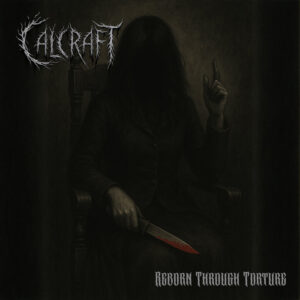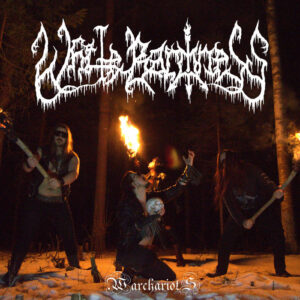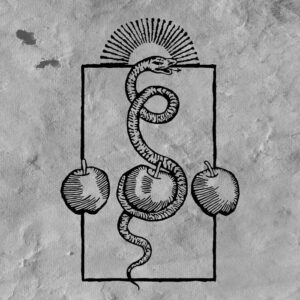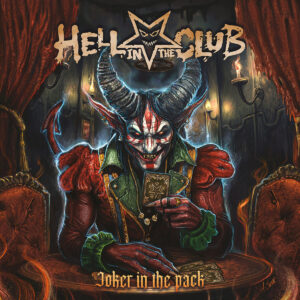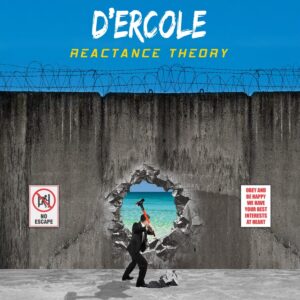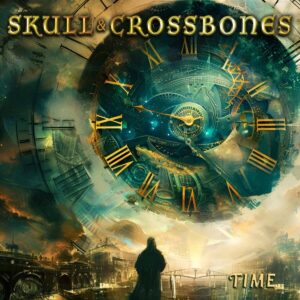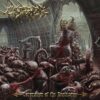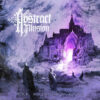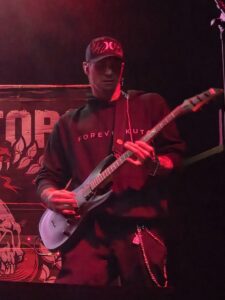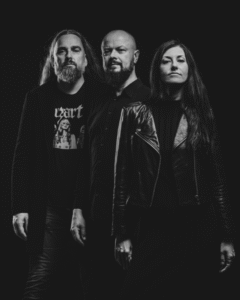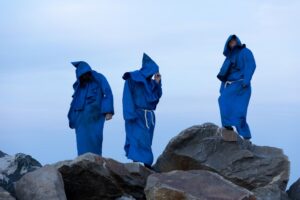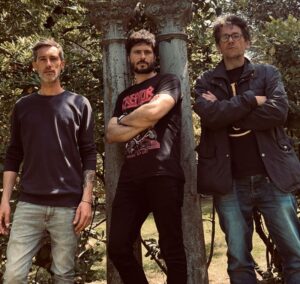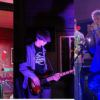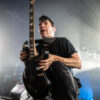Jacob Curwen
All Hell
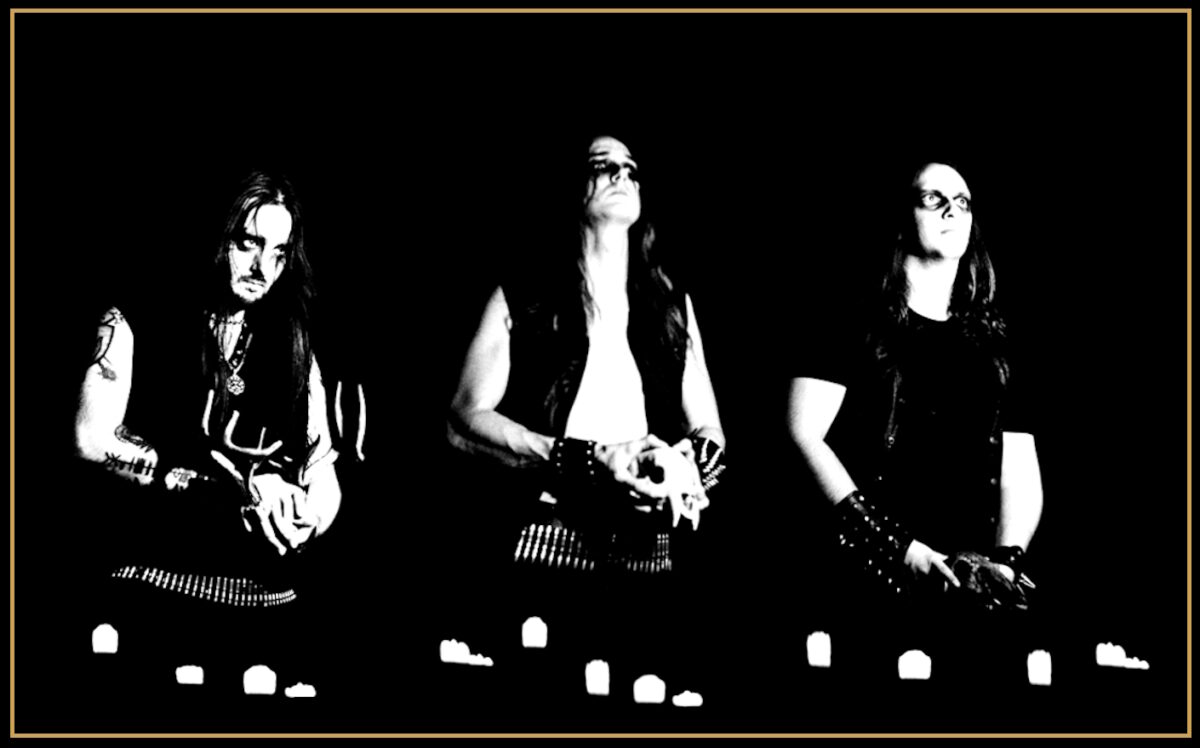
"It's apocalyptic, because sometimes that's exactly what it takes." - Jacob Curwen, All Hell
interview at
How did ALL HELL form?
Jacob: The band was conceptualized by myself and the original drummer. We started jamming, I brought a couple of songs to the table, and shortly thereafter we recruited Erik on bass, who has remained with the band since our first show.
Any significance behind the name?
Jacob: The name definitely has significance – I wanted to pay homage to two of my favorite bands of all time, MISFITS and SAMHAIN, so I chose ALL HELL, after the SAMHAIN version of the MISFITS' “All Hell Breaks Loose.” It is also intentionally a name that doesn't imply any one particular genre, which was important to me.
How would you say ALL HELL has evolved since your formation?
Jacob: The biggest leap stylistically was between the first and second albums. Our debut absolutely shows the 'horrorpunk' influences that shaped the initial concept of the band. Funnily enough, the second record was actually written before the first album released, so even in the very early days we had quickly moved beyond what we felt were the confines of that genre. You can hear us heading closer to what we would become on “Suffer for Me” and “Devilwolf,” both of which were written late in the first album process. (And both of which we would re-record a decade later for the “All Hail the Night” EP!).
Since the second album, the band has felt cohesive to me, but there are definite evolutions between the records. Every one builds on what came before, and “Sunsetter” is no different in this aspect. This one taps into a similar energy as “The Red Sect” but pushes into more extreme territory, musically. The new songs on the preceding EP hinted at the themes and vibe of the record as well.
ALL HELL has been described as Black, Thrash, Punk, and, of course, Blackened Thrash? How would you characterize the band’s style?
Jacob: It's hard to say, exactly, and we like it that way. There are aspects to our sound that are derived from all of those genres. We obviously draw a lot of influence from “first wave” black metal (so the “blackened punk” references are kind of silly, since that early stuff came from punk in the first place. . .), but by no means do our influences end there. Second wave, thrash, and deathrock also play a role, along with soundtracks and other non-metal music. We've also heard the term “vampiric black thrash” thrown around, which is actually pretty fitting, except for the fact that “vampiric black metal” these days typically implies either weak whiny music by poseurs with swords, or mediocre early Bathory riffs with a chorus pedal on top. Neither of which description applies to us, obviously.
Promo material mentions several setbacks the band had over the years and “found themselves burned out and disillusioned with metal entirely.” Can you tell us about the journey back?
Jacob: The setbacks started obviously with Covid, which disrupted the whole music world. So, we can't complain too much there, as we weren't faced with anything that everyone else wasn't dealing with. But it did interfere with our momentum significantly. We had JUST come out of a record deal and begun working on new stuff, very few labels were doing any significant signings during the time, and the lockdowns and production turnaround times really messed with the flow we had established. That's why there were one - two years between the previous records, and four years between the last album and the “All Hell the Night” EP.
After the fourth album, we had lost our longtime drummer, Kurt Henderson, who had other life obligations and was unable to meet the scheduling demands at the time – finding someone suitable to step into his shoes was not an easy task. We had a fill-in for a while, who wasn't a good fit for the band creatively and was unable to tour. Eventually, we found Elan, who turned out to be a perfect fit for this record and was totally committed.
I was a bit disillusioned with the metal world for many reasons—the trend hopping, disingenuous artists out there, the lack of innovation, particularly in the American scene where most “successful” bands these days are merely worse versions of established European bands, the nepotism of the music industry. . .it's all a bit off-putting. I felt that if all THAT was what metal was, I had no interest in being “metal.” So, I decided that when I wrote the new record, I would just let creativity flow, not go in with a plan of what it would be, and not constrain myself by worrying if something was acceptably metal or not. Funnily enough, I think the end result was the most metal and objectively extreme record we've done.
Sunsetter is a total ripper from beginning to end. It seems like ALL HELL is back with vengeance. Tell us about how this album came together.
Jacob: Following where we left off on the last question, I think it's the result of letting go and just letting the album happen. Of course, there were considerations of structure and flow of the record along with the narrative elements fitting together, but we ended up with something we're all proud of. We have blastbeats alongside more cinematic spoken word tracks, alongside mid-tempo anthems and nods to traditional hard rock, but I think there is no mistaking that this album is “All Hell” from start to finish.
The narrative of Sunsetter is fairly deep and complex. Can you give us a quick synopsis?
Jacob: Narratively – it's an album about fate, death, exile, and resurrection. We all share blood with the First Murderer. We're all cursed. But we survive, calamity after calamity. . .sometimes in darkness, sometimes in light. It's about rejecting what the world has imposed upon us and laying claim to life itself. It's apocalyptic, because sometimes that's exactly what it takes.
Why this story? Why now?
Jacob: The concepts for this album were already stirring around my head as soon as we were done with 2019's “The Witch's Grail.” I knew I wanted to do something in the near future, and the vision of this vampiric death cult in the modern world struck me. I was already leaning towards something apocalyptic, when the Covid pandemic struck and shut down the world for 18 months. This was just fuel for the fire. I added in more mythological and biblical elements, and the vision of something spanning millennia began to take shape. Eventually, I knew the first half of the record would take place in ancient times and lead up to the Great Flood, and the second half would take place in the near future leading up to an even greater apocalypse and the return of ancient Evil. In a grim coincidence, the song titled “The Flood and the Death” was titled and had lyrics written a mere two weeks before the disastrous flooding that destroyed a lot of our city.
As for why now, one can just take a look outside, or if they're brave enough, look at the news. Rampant fires, floods, other natural disasters, insane crime statistics, the pandemic. . .it's hard not to feel like these times are a bit apocalyptic!
The cover art seems like quite the departure from previous covers. Was this intentional? Is there a story behind it? Also, who did the artwork?
Jacob: We knew this one needed to be a bit different. We wanted something appropriately “Biblical” yet modern, and we knew we wanted a painting. I ended up handling this artwork myself, via digital painting, though the process, with all its layering, blending, and texturing, was all done by hand and was essentially the same as if I'd done it on canvas. It went through many, many hours and iterations, and I studied my inspirations very closely for insights. The works of Caravaggio and Grunewald were key.
Tell us about your musical influences. What bands are on your playlist? Anything that would surprise us?
Jacob: Too many to name! Of course there are the old standby records, especially MISFITS/SAMHAIN/DANZIG this time of year. Old black metal, old synth music, soundtracks. As far as newer stuff, the new Sargeist record was solid and I think all three of us enjoyed the new Scorpion Milk album. For something that may surprise you. . .all three members, along with vintage black metal, really dig Italo disco and Soviet post punk.
Artificial Intelligence (AI) seems to be impacting everything, and metal is no exception. There was the controversy with HAIL DARKNESS and now there is CZART out of Poland who seem to be doing some really innovative things with AI. Is there a place for AI in metal?
Jacob: This is a complex one. First, I will say that I don't believe there's any place for AI in All Hell, whether in art, music, merch, or anything else. I'd say we all feel strongly about this.
However, in the context of metal or music as a whole, I could see something interesting happening with it eventually, but I don't know what that will look or sound like. Everything I'm aware of that has utilized generative AI thus far sounds terrible and comes across as super gimmicky, but if someone uses it as a tool in the correct way, I could see something possibly interesting coming out of it. One thing is for sure; Pandora's box has been opened, and there's no going back to a world without AI (unless our aforementioned apocalypse happens). Artists will all have to learn how to adapt to the new landscape, whether they embrace or reject it.
What’s next for ALL HELL?
Jacob: After the album release shows, things will be quiet on the touring front until early next year. We hope to share some dates with folks soon. We're completely revamping our set list and stage show and can't wait to get in front of as many people as possible. And of course, I'm always writing . . .
Any special message for your fans out there?
Jacob: Just a big thank you to everyone who has supported us on our journey thus far. If we play near you, come out and bring some friends!
Tags:
More results...
